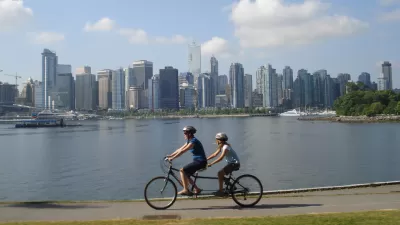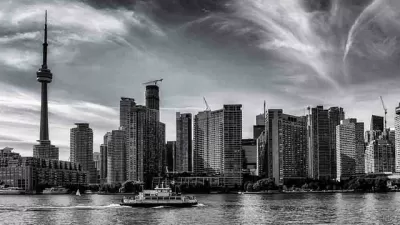Vancouver's remarkable experiment in livable density is the envy of, and model for, cities across the world. So, after a decade of skyline expansion across Canada, why has densification 'lost steam' in the country? Doug Saunders investigates.

"[Vancouver's] combination of high population density in cozy downtown neighbourhoods, intimate street life and popular public transit has become one of Canada’s leading exports: When I visit cities in Europe and the United States, their officials talk earnestly of adopting 'Vancouverism,'" observes Saunders. "To Vancouverize, in the minds of mayors, is to make residents realize that having a crowded, people-packed downtown core is not a problem but a solution. Canadians have known the grim tedium of low-density cities, but now we’re known for the opposite."
Canadian cities are in desperate need of densification to confront the pressing problems of population growth, sprawl, rising housing costs, and funding for quality of life enhancements, he argues.
"And yet one place where Vancouverism has lost steam is in Canada. Developers tell me that it has become almost impossible during the past three years to get even tasteful mid-rise apartment projects approved in Toronto, as a populist, suburban mayor allows local residents to block anything. Montreal’s blend of corruption and paralysis has prevented much-needed density growth. And even Vancouver, according to one report, still has more than 7,000 surplus parking spaces, and downtown development is now stagnant."
"We lived for six decades with sprawling outskirts and the anomie of parking-lot downtowns," urges Saunders. "Now that we’re famous for inventing an alternative, it’s time to embrace it."
FULL STORY: Doug Saunders: The world wants Vancouverism. Shouldn’t Canada?

Maui's Vacation Rental Debate Turns Ugly
Verbal attacks, misinformation campaigns and fistfights plague a high-stakes debate to convert thousands of vacation rentals into long-term housing.

Planetizen Federal Action Tracker
A weekly monitor of how Trump’s orders and actions are impacting planners and planning in America.

In Urban Planning, AI Prompting Could be the New Design Thinking
Creativity has long been key to great urban design. What if we see AI as our new creative partner?

King County Supportive Housing Program Offers Hope for Unhoused Residents
The county is taking a ‘Housing First’ approach that prioritizes getting people into housing, then offering wraparound supportive services.

Researchers Use AI to Get Clearer Picture of US Housing
Analysts are using artificial intelligence to supercharge their research by allowing them to comb through data faster. Though these AI tools can be error prone, they save time and housing researchers are optimistic about the future.

Making Shared Micromobility More Inclusive
Cities and shared mobility system operators can do more to include people with disabilities in planning and operations, per a new report.
Urban Design for Planners 1: Software Tools
This six-course series explores essential urban design concepts using open source software and equips planners with the tools they need to participate fully in the urban design process.
Planning for Universal Design
Learn the tools for implementing Universal Design in planning regulations.
planning NEXT
Appalachian Highlands Housing Partners
Mpact (founded as Rail~Volution)
City of Camden Redevelopment Agency
City of Astoria
City of Portland
City of Laramie




























